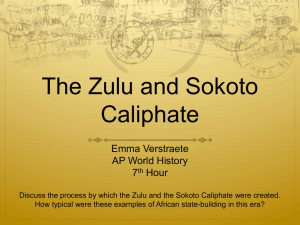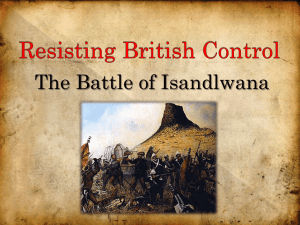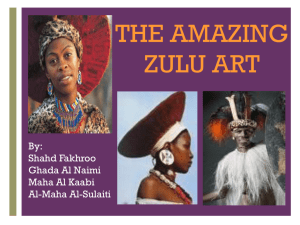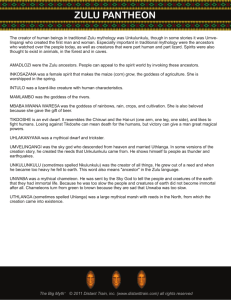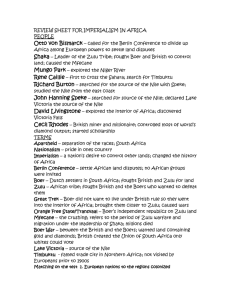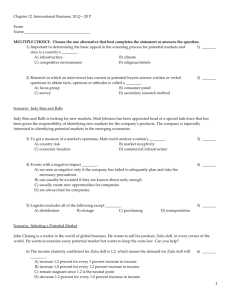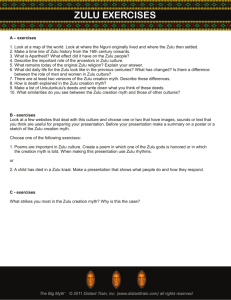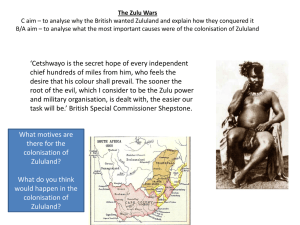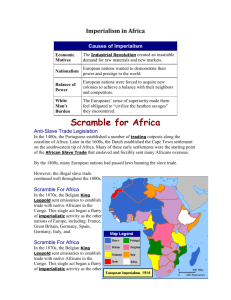The British Invasion of Zululand: Some Thoughts for the Centenary
advertisement
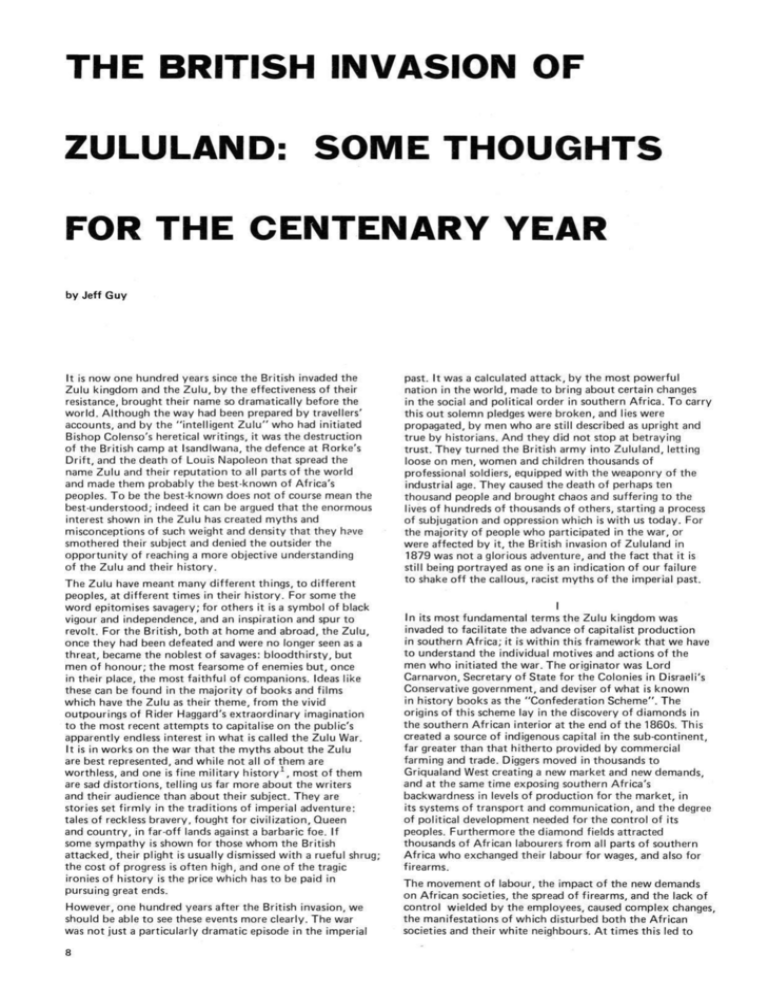
THE BRITISH INVASION OF ZULULAND: SOME THOUGHTS FOR THE CENTENARY YEAR by Jeff Guy It is now one hundred years since the British invaded the Zulu kingdom and the Z u l u , by the effectiveness of their resistance, brought their name so dramatically before the w o r l d . Although the way had been prepared by travellers' accounts, and by the "intelligent Z u l u " who had initiated Bishop Colenso's heretical writings, it was the destruction of the British camp at Isandlwana, the defence at Rorke's D r i f t , and the death of Louis Napoleon that spread the name Zulu and their reputation to all parts of the world and made them probably the best-known of Africa's peoples. T o be the best-known does not of course mean the best-understood; indeed it can be argued that the enormous interest shown in the Zulu has created myths and misconceptions of such weight and density that they have smothered their subject and denied the outsider the opportunity of reaching a more objective understanding of the Zulu and their history. The Zulu have meant many different things, to different peoples, at different times in their history. For some the word epitomises savagery; for others it is a symbol of black vigour and independence, and an inspiration and spur to revolt. For the British, both at home and abroad, the Zulu, once they had been defeated and were no longer seen as a threat, became the noblest of savages: bloodthirsty, but men of honour; the most fearsome of enemies but, once in their place, the most faithful of companions. Ideas like these can be found in the majority of books and films which have the Zulu as their theme, from the vivid outpourings of Rider Haggard's extraordinary imagination to the most recent attempts to capitalise on the public's apparently endless interest in what is called the Zulu War. It is in works on the war that the myths about the Zulu are best represented, and while not all of them are worthless, and one is fine military h i s t o r y 1 , most of them are sad distortions, telling us far more about the writers and their audience than about their subject. They are stories set f i r m l y in the traditions of imperial adventure: tales of reckless bravery, fought for civilization, Queen and country, in far-off lands against a barbaric foe. If some sympathy is shown for those whom the British attacked, their plight is usually dismissed w i t h a rueful shrug; the cost of progress is often high, and one of the tragic ironies of history is the price which has t o be paid in pursuing great ends. However, one hundred years after the British invasion, we should be able to see these events more clearly. The war was not just a particularly dramatic episode in the imperial 8 past. It was a calculated attack, by the most powerful nation in the w o r l d , made to bring about certain changes in the social and political order in southern Africa. To carry this out solemn pledges were broken, and lies were propagated, by men who are still described as upright and true by historians. And they did not stop at betraying trust. They turned the British army into Zululand, letting loose on men, women and children thousands of professional soldiers, equipped w i t h the weaponry of the industrial age. They caused the death of perhaps ten thousand people and brought chaos and suffering to the lives of hundreds of thousands of others, starting a process of subjugation and oppression which is w i t h us today. For the majority of people who participated in the war, or were affected by it, the British invasion of Zululand in 1879 was not a glorious adventure, and the fact that it is still being portrayed as one is an indication of our failure to shake off the callous, racist myths of the imperial past. I In its most fundamental terms the Zulu kingdom was invaded to facilitate the advance of capitalist production in southern Africa; it is w i t h i n this framework that we have to understand the individual motives and actions of the men who initiated the war. The originator was Lord Carnarvon, Secretary of State for the Colonies in Disraeli's Conservative government, and deviser of what is known in history books as the "Confederation Scheme". The origins of this scheme lay in the discovery of diamonds in the southern African interior at the end of the 1860s. This created a source of indigenous capital in the sub-continent, far greater than that hitherto provided by commercial farming and trade. Diggers moved in thousands to Griqualand West creating a new market and new demands, and at the same time exposing southern Africa's backwardness in levels of production for the market, in its systems of transport and communication, and the degree of political development needed for the control of its peoples. Furthermore the diamond fields attracted thousands of African labourers from all parts of southern Africa who exchanged their labour for wages, and also for firearms. The movement of labour, the impact of the new demands on African societies, the spread of firearms, and the lack of control wielded by the employees, caused complex changes, the manifestations of which disturbed both the African societies and their white neighbours. A t times this led to A rare 19th-century photograph of Zulu soldiers in ceremonial dress. violence as in the Langalibalele incident in Natal in 1873. Officials in London looked at the situation in southern Africa w i t h concern. It seemed as if there was sufficient locally generated wealth to provide a sounder, more secure, system of government: however as long as the region was divided into different political systems there was no chance of bringing into being the overall control required for the development of southern Africa. By his confederation scheme Carnavon hoped to break down the political divisions between the British colonies, Boer republics, and independent African states and communities. Once this was done, and the people of southern Africa brought under centralised control, it would be possible to build the infrastructure needed for the more effective exploitation of southern Africa's wealth. Carnarvon met considerable opposition to his plans for confederation w i t h i n southern Africa. The Cape felt that the sacrifices it would have to make for the other communities would be too great, and the Boer republics were reluctant to give up their independence. African leaders were not consulted. Carnavon did find some local supporters however, and the most important of these was Theophilus Shepstone, Secretary for Native Affairs in Natal for the previous t h i r t y years, and a man w i t h a considerable reputation in London as an astute administrator w i t h an unrivalled knowledge of southern Africa and its people. A well-known British historian has w r i t t e n , in a book published recently, that Shepstone was "an attractive, courageous and knowledgeable man w i t h a deep affection for, and understanding of, the Z u l u s " 3 Conclusions such as these are drawn from the secondary material on South African history and reveal the extent t o which South African historians have failed to distance themselves from their imperial past. If any one man was responsible for the destruction of the Zulu kingdom and the suffering of its people then it was Somtsewu — the name by which Shepstone was known to the Zulu, and which does not mean " m i g h t y hunter . . . " &c, & c , but is a Zulu/Sotho hybrid meaning "Father of Whiteness". Shepstone's vision of the future of the sub-continent was expansionist; he was driven by the conviction that the future of South Africa depended on the acquisition of the resources of the subcontinent by whites, and that they should be served by black labour. A t the same time Shepstone was sufficiently aware of the realities of the situation to know that a frontal attack on the African way of life, and the appropriation of their land, was not possible. He therefore supported the idea of leaving Africans in possession of large tracts of land, but, by gradually usurping political control, diverting the surplus products and labour created in African societies to support colonial systems of government. While he was Secretary for Native Affairs in Natal much of Shepstone's energy was expended in attempting t o acquire African labour and African land for the colony. Thus the independent kingdom of the Zulu, which shared a common frontier w i t h Natal, was of particular interest and concern. Not only did it have large amounts of land and labour, both of which lay out of reach of Natal, but it occupied territory between the Boer republic of the Transvaal and the sea, thereby cutting Natal off f r o m the wealth of the African interior. Unlike most southern African black communities the Zulu kingdom had, by the 1870s managed to retain its essential independence. The Zulu remained in possession of the core of the territory which Shaka had conquered at the beginning of the century. They had successfully resisted the attempts of settlers to seize their land, of missionaries to convert them, and of traders to change their economic life. As a result the labour of Zululand was expended w i t h i n the kingdom and supported a population of perhaps 250 000 9 and an army of about 30 000 t o defend their heritage. The settler communities which virtually surrounded Zululand by the 1870s looked enviously at the resources which they were unable to appropriate, and, in spite of the kingdom's strength, its rulers were well aware that in the context of expanding settler colonialism their position was a precarious one. There were divisions w i t h i n the kingdom which its neighbours were eager to exploit. On Zululand's north-western border the Boers were advancing, creating the tensions and disputes which had formed the prelude to so much suffering amongst the Zulu's African neighbours. Thus when the old king, Mpande died in 1872, his son and successor, Cetshwayo, asked for formal recognition from Theophilus Shepstone. The Secretary for Native Affairs was only too ready to take advantage of the invitation: it was sound policy to acquire a degree of influence over Natal's formidable neighbour, it would facilitate the movement of African labour through Zululand, and it might be used in Natal's quest for land and labour. Cetshwayo in turn believed that in gaining Natal's support for* his succession he had acquired a useful diplomatic ally, especially in his border dispute w i t h the Boers. In September 1873 Shepstone travelled to Zululand and formally recognised Cetshwayo as King of the Zulu. In the following year Shepstone went to London t o consult w i t h the Colonial Office in the aftermath of the Langalibalele affair in Natal. Carnarvon was deeply concerned about southern African affairs and Shepstone's ideas, it has recently been argued,4had a significant effect on his thinking and the subsequent development of the plan for Confederation. T w o years later Carnarvon chose Shepstone to play a crucial part in the scheme when he was given the authority to annex the Transvaal to Britain, if he could count on Boer support. In April 1877 Shepstone annexed the Transvaal and became its first administrator, and in so doing destroyed the diplomatic understanding he had reached w i t h Cetshwayo. Whereas the Zulu had expected his support in their dispute w i t h the Transvaal he had now "become a Boer" himself. Moreover Shepstone, urgently in need of Boer backing for the annexation, attempted to w i n this by persuading the Zulu to accept certain Boer claims to their land. In October 1877 Shepstone travelled to the Zulu border for discussions on the boundary dispute. The Zulu delegation saw through Somtsewu immediately and accused him of treachery. In his fury and frustration Shepstone at first thought of marching his escort into Zululand, but then turned to less direct, but ultimately more effective methods, of bending the Zulu to his w i l l . In his despatches he began to back Boer claims to the Zulu land, justifying his changed attitude on the grounds that he had discovered documents in the Transvaal previously unknown to him. Historians have as yet failed to find these documents. Then, as an official put it later, he turned his coat in a most "shameless" manner. He wrote of the imminent danger that the Zulu kingdom posed to the peace and prosperity of southern Africa. "Had Cetywayo's t h i r t y thousand warriors been in time changed to labourers working for wages, Zululand could have been a prosperous, peaceful country instead of what it now is, a source of perpetual danger to itself and its neighbours." These warnings were eagerly accepted by the High Commissioner in southern Africa, Sir Bartle Frere. Frere had been appointed to implement the confederation scheme and was an imperial official of great experience. The political union of southern Africa was to be the crowning achievement of his career. With the Transvaal apparently out of the way it was clear to him that the Z u l u , independent, self-sufficient, feared by their neighbours, were the most immediate obstacle to his plans. To prepare the way for the removal of this obstacle Frere 10 began to write a series of public despatches in which he described the Zulu and their king in the most exaggerated and lurid terms. Shepstone's letters and despatches were of great assistance to Frere and he used them, together w i t h information from colonial officials, traders and disappointed Zululand missionaries to demonstrate that there was an attempt being made in southern Africa to unite the forces of barbarism against those of progress: that many African leaders felt " t h a t the time was come for them all to join to resist the flood of new ideas and ways which threatened to sweep away the idle sensuous Elysium of Kaffirdom, such as Gaika and Chaka and Dingaan fought for and enjoyed". The answer to this threat lay in the extension of white authority: the African "must be governed, not neglected and left t o follow their own devices. They are very teachable, and can be made t o take in all the cost and much of the labour of their own government, but the impulse and the standards of right and wrong must be European." 5 Frere chose to depict Cetshwayo as the leader of this atavistic movement. He was a "bloodthirsty t y r a n t " who took his uncle Shaka as a model, and w i t h his army, that "celibate, man-slaying machine" as Frere was to describe it, he threatened the peace of the sub-continent. Making use of rumours f r o m Zululand to support his charges he accused Cetshwayo of subjecting his people to brutal tyranny, and he turned minor border disputes into examples of provocation and defiance. In spite of mild protests from his superiors in London over what appeared t o be an unnecessarily aggressive approach, and the warning that he should avoid war in south Africa at the moment, Frere moved troops to the Zulu border. Then, in December 1878, w i t h o u t obtaining authority from London, Frere presented the Zulu king w i t h an ultimatum, the demands of which Cetshwayo could not accept w i t h o u t surrendering his sovereignty. On the morning of 11 January 1879 British troops, under the command of Lord Chelmsford, entered Zululand t o enforce the demands of the ultimatum. Again, it is an indication of the failure of South African historians that the well-known author of an extremely successful biography of Disraeli has written that, after the annexation of the Transvaal, for the Zulu "an attack on the Boers meant war w i t h the English, towards whom Cetewayo was on the whole quite well disposed. Why in that case, it might be asked, go to war at all? The answer is that the whole social structure of the Zulu state was geared to that purpose. Cetewayo had revived the traditional system whereby the youth of the nation was conscripted into strictly celibate regiments confined to great military homesteads in the area of the royal Kraal. Marriage was rigidly forbidden until the young warrior had washed his assegai in blood, as the saying went. The strongest of human instincts, therefore, was allied w i t h natural bloodthirstiness in a determination to fight someone somewhere." 6 . To describe this passage as nonsense is being charitable and Lord Blake clearly knows more about the history of the Conservative party than about the natives. But his information is drawn from the sort of propaganda spread by the imperial officials before the invasion and which has still to disappear from the secondary material. Such views admittedly seem to be diminishing and it is perhaps now more common to adopt the view that the war was a necessary action, undertaken to give the Zulu their freedom and southern Africa security; or that the war was unfortunate, perhaps even a tragedy, but an example of the inevitable clash when two powerful but incompatible cultures meet. But now, in 1979, we can surely go further than this and ask why this specific clash took place; and this demands that we consider the fundamental changes which had taken place in southern Africa as a consequence " L o r d Chelmsford withstood the shower of ignorant criticism and vituperation. Like most Thesigers (the family name) he was a cricketer, and long before his first experience of war had learnt to accept defeat w i t h a good grace and to make no excuses. His critics, on the other hand, can hardly have been cricketers . . . " 8 But expressions like this cannot just be laughed off, for they reflect the aristocratic/military ethos which pervades not only the sources but also the reconstructions of the invasion, and make it difficult to reach an understanding of the motives and the feelings of the majority of participants in the war. The bulk of the men who planned and prosecuted the war were drawn from the landed classes. They chose to depict the war as a game, the hunt w r i t large, and they influenced the whole image of war for the writers and film-makers who followed them. They are fascinated by this idealised picture of the British upper-class, eccentric, imperturbable, pursuing their way of life in the wilds of Zululand, but when necessary dashing and courageous. Cetshwayo kaMpande, king of the Zulu from 1872 to 1879: a photograph taken during his exile after the Anglo-Zulu war. of the discovery of diamonds, and the vision that this raised in men's minds about the sub-continent's future. For this vision to be realised a greater degree of control, over a larger area, was necessary; only then could the region's resources be effectively exploited. The Zulu kingdom stood in the way of this and had to be removed, and its very success in withstanding change made it necessary t o deploy thousands of British troops and mount an armed invasion. To justify this, both to themselves and to those around them, the officials responsible had first to create a false image of the Zulu kingdom, to make a racial caricature of the Zulu king, to falsify the way of life of his people, and to distort their history. These means can be shown empirically to be based on falsification. Whether one can support or sympathize w i t h the ends the officials had in view depends ultimately on one's own attitudes, to human society in general, and to South Africa in particular, and to the role South Africa's past has played in creating the present. II It would be difficult to find in the histories of the war any substantial passage which did not reveal either ethnocentric bias, misleading romanticisation, pro-British distortion, or racist attitudes. Historians tend to pass over the fact that the Zulu were defending themselves, their wives and children, and their way of life against an unprovoked attack; Zulu victories are too often characterised as massacres while the British inflict defeats on the enemy: the Zulu commit atrocities on their enemies, unlike the British when they destroy homesteads, shoot down thousands w i t h ranked volley-firing, dismember their enemy at a distance w i t h artillery, or "butcher the brutes" w i t h their cavalry. There is a tendency to depict war in the exhilarating language of the chase. It is clear that this is how many officers taking part in the invasion saw it: "We had a glorious go in, old boy, pig-sticking was a fool to it . . . With a tremendous shout of 'Death, Death!' we were on them. They tried to escape, but it was no use, we had them any how, no mercy or quarter from the 'Old T o t s ' . " 7 These sporting images which are so prevalent in the literature on the war can be ludicrous. For example Gerald French, in his defence of Lord Chelmsford published in 1939, explained Chelmsford's reaction to criticism after the Zulu victory at Isandlwana in the following terms: However, the majority of men who fought and died in the war did not come from this particular social strata, and for them the British officer was not an attractive figure, and the war was no game. These were the Zulu whose country had been invaded, who had suffered terrible losses even in those battles in which they were victors. The words that Bishop Colenso preached after Isandlwana still have force: " . . . we ourselves have lost very many precious lives, and widows and orphans, parents, brothers, sisters, friends are mourning bitterly their sad bereavements. But are there no griefs - no relatives that mourn their dead — in Zululand? Have we not heard how the wail has gone up in all parts of the country for those who have bravely . . . and nobly died in repelling the invader and fighting for their King and fatherland? A n d shall we kill 10 000 more to avenge the losses of that dreadful d a y ? " 9 And what of the British soldier in the ranks, the man whose life depended on the decisions made by those placed over h i m , and who in 1879 died too often as a result? Although a worthwhile attempt has recently been made to give h i m a voice 1 0 the evidence we have about his feelings during the war is slight. But it seems unlikely that this private was expressing an isolated opinion when he wrote, the morning after the defence of Rorke's D r i f t , " . . . I daresay the old Fool in command will make a great fuss over our two officers commanding our company in keeping the Zulu Buck back w i t h the private soldier what will he get nothing only he may get the praise of the public . . Z ' 1 1 And what of the Sergeant who saw the battlefield at Isandlwana: " . . . when we saw what has happened every man could not help crying to see so many of our poor comrades lying dead on the ground, which only a few hours before that we left them all well and hearty. You could not move a f o o t either way w i t h o u t treading on dead bodies. O h , father, such a,sight I never witnessed in my life before. I could not help crying to see how the poor fellows were massacred." 1 2 Or Private Moss from Wales? "Dear father, and sisters, and brothers, goodbye. We may never meet again. I repent the day I took the shilling. I have not seen a bed since I left England. We have only one blanket, and are out every night in the rain — no shelter. Would send you a letter before but have had no time, and now, you that are at home stay at h o m e . " 1 3 I have been unable to find any adequate analysis of the social background of the British soldier at this time but it 11 can be assumed that he was drawn from the working-class or its fringes. One historian of the British army describes him as recruited "mostly from the very poorest and most i g n o r a n t " 1 4 in Britain, and we know that large numbers of men in the Anglo-Zulu War came from Wales and others from the industrial areas. It seems to me that an important perspective of the war, as yet untouched by historians, is that it was fought by men drawn from the British proletariat on the one side, and on the other side by men fighting to save themselves from becoming members of that class in South Africa. Ill This continual viewing of the war through the eyes of the class that prosecuted it does more than close us off from the experiences of most of the participants. It also leads to severe misinterpretation about the war and its part in the history of South Africa. Generally speaking, accounts of the invasion concentrate on the formal battles: the Zulu victory at Isandlwana, the defence at Rorke's D r i f t , the British victory at Khambula, and the culmination of the war at Ulundi where the British army had its revenge, and in so doing put an end to the independent Zulu kingdom and the reign of the House of Shaka. I would argue that this approach is severely limited, and in fact reflects the interpretation forced on events at the time by politicians and by military leaders who were far more concerned about the protection of their positions and their reputations than in giving an accurate account of the events which took place. As I have stated above, the framework in which the war must be seen is that of the needs of developing capitalism in southern Africa. This required a single political and administrative authority to supervise a system which allowed greater control, more efficient communication, and the free flow of labour on the sub-continent. Frere's position as the man appointed to oversee confederation was hampered early in 1878 when Lord Carnarvon resigned from the British government. His place was taken by Sir Michael Hicks Beach, a man who does not appear to have been as committed, well-informed or enthusiastic about confederation as its initiator. Furthermore, at this particular point in time the demands of foreign policy made it necessary to deploy British troops in other parts of the w o r l d . Hicks Beach therefore tried, not very f i r m l y , to dissuade Frere from going to war w i t h the Zulu in pursuit of confederation. Frere's response was to ignore Hicks Beach's warning, deprive the Colonial Office of information, and to take advantage of the length of time it took to communicate w i t h London, hoping to present his superiors w i t h a defeated Zululand before they were able to check him. He was confident that he could do this. Shepstone had persuaded him that the Zulu kingdom was so divided and that opposition to Cetshwayo was so widespread that it " w o u l d fall apart when t o u c h e d " . And we can get an idea of how Frere planned to treat the conquered Zulu from his private correspondence. After the British army had been in Zululand for more than a week and there had been no sign of the Zulu army it seemed as if Shepstone had indeed been right and that Cetshwayo was unable to rally his people and mount a concerted defence. Frere wrote to Chelmsford: " A c t i n g as Glyn's and Wood's columns are now doing, you will virtually annex and settle the country, as you proceed, and greatly simplify proceedings when Cetywayo is disposed of. I have no idea of recommending any revival of a paramount chief or king or of any separate Zulu nationality. A n active and absolute Military Administrator, w i t h a f i r m grasp of the country, by means of the pick of your native Regts. as Sepoys and Police, and supported by a backbone of H.M. Troops, will keep order among the chiefs who submit and obey, and will after putting down opposition govern directly, through headmen, the 12 subjects of those who resist — all as subjects of Queen Victoria . . . I am not reckoning my chickens before they are hatched, but merely sketching what should I think be our object in the, I trust now inevitable, event of the Zulus being relieved from the monster who has so long been an incubus to them as well as a terror t o his neighbours . . , " 1 5 . The day after this letter was written the Zulu army attacked the British camp at Isandlwana killing nearly 1500 of its defenders and capturing a huge store of arms, ammunition and supplies. Chelmsford and the remainder of the column retired to Natal to await reinforcements. The news of the defeat at Isandlwana reached London on February 1 1 . Disraeli wrote that he was "greatly stricken". " I t will change everything, reduce our Continental influence, and embarrass our finances." His parliamentary opponents took full advantage of the defeat. The Liberals were inclined to the view that the forces of capitalism should be allowed to develop w i t h o u t state interference, and that the aggressive pursuit of land, labour and markets was not only of doubtful morality but also drained the pockets of the British tax-payer. In the press and in parliament Disraeli's Conservative government came under attack for its " f o r w a r d " policy which had led to the disaster at Isandlwana. Now fully aware of the folly of having given Frere so much freedom his superiors brought him under control. The High Commissioner was publicly censured and he was formally reminded that he did not have "the authority either to accept a cession of territory or to proclaim the Queen's sovereignty over any part" of Zululand, and that Her Majesty's Government was " n o t prepared to sanction any further interference w i t h the internal government of the country than may be necessary for securing the peace and safety of the adjacent colonies." 1 6 Thus Frere's hopes of a quick, inexpensive war which would crush Zulu independence before the morality or the efficacy of the invasion could be questioned were destroyed on the battlefield of Isandlwana. Shepstone's plans to use imperial policy to gain Zulu land and labour for Natal and to establish a bridgehead for expansion into the African interior were also lost as a consequence of the effectiveness of the Zulu resistance. And moreover the confederation policy itself had suffered a grevious blow: as de Kiewiet put it, Isandlwana "marks a definite turning point in British South African policy. A policy that in straining after confederation had not hesitated to annex an independent republic, and that would certainly have annexed Zululand and other territories, now turned about and began to slip down the arduous path it had steeply trodden, back again finally to abandonment and non-interference." 1 7 Arguing in terms of the policy which had initiated the war and the intentions of the men who prosecuted it, it could be said that the Zulu defeated the British in 1879. A t the same time however the war had gained a momentum of its o w n ; the Zulu by their victory at Isandlwana had ensured that the British would continue their onslaught against them. The defeat at Isandlwana had to be avenged. Britain's reputation as the dominant nation had to be asserted, at home to those who paid for the British army, and in southern Africa and beyond to those who lived under British control. The dreadful consequences of daring to effectively defend one's independence against the British army had to be publicly demonstrated. Furthermore, the British officers whose incompetence had led to Isandlwana had to t r y and restore their reputations by inflicting an unequivocal defeat on the Zulu. In the conventional view all these aims were achieved at the battle of Ulundi on 4 July 1879 when the Zulu army attacked the British forces and is supposed to have suffered such terrible losses that it never went into the field again. Ulundi is usually described in terms of a decisive battle between Africa's greatest army and the British redcoat, w i t h the heirs of Shaka finally being taught where real' power lay in the last quarter of the nineteenth century. I would argue that this interpretation of the significance of the battle of Ulundi is, once again, the consequence of depending too heavily and uncritically on sources derived from the men who initiated and led the war - the men who needed just such a victory to save their military and political reputations. To appreciate this we must examine the situation faced by the military leaders on both sides at the end of June 1879, five months after Isandlwana and a few days before Ulundi. Cetshwayo, as leader of the Zulu army, was in an extremely difficult position. Firstly there were the terrible losses the Zulu had suffered in their engagements w i t h the British, culminating in their attack on the northern column at Khambula in March when perhaps 2000 Zulu died. But as important a factor as these casualties in battle was the social disruption caused by the invasion. The Zulu kingdom did not possess a "standing a r m y " , organised to fight w i t h o u t seriously disrupting life in the kingdom. The mobilisation of the army caused confusion in the administration of the state, and disruption in the processes of production upon which life in the kingdom depended. The movement of tens of thousands of men w i t h i n the kingdom added to the distress, for the Zulu army was still organised as a raiding force. Thus, while arrangements for feeding the army existed, they were insufficient t o supply the army in the field, w i t h i n the borders of the kingdom, for extended periods of time. The passage of the army through the kingdom caused suffering and deprivation amongst the Zulu homesteads which lay in the soldiers' path. By the time the Zulu attacked British positions the soldiers were often starving. The need to fight a defensive war on Zulu soil placed a severe strain on Zulu society as a whole. Furthermore the fact that the Zulu soldiers dispersed to their homes after every engagement made it impossible for Cetshwayo to develop an effective strategy to use against the enemy. He wanted his men to avoid massed attacks on heavily defended British positions and instead to lay siege to the British forces and attack their extended supply lines But this proved impossible because the Zulu army could not keep itself supplied in the field for the required length of time: the soliders mounted precipitate attacks and then dispersed to their homesteads to regather their strength and protect their property - f r o m British and Zulu forces. Cetshwayo's decision to adopt a defensive strategy also severely limited the effectiveness of the Zulu army. The king had decided that he would be in a far stronger diplomatic position if, as non-aggressor in the war he kept his troops w i t h i n Zululand's borders. If, after Isandlwana he had allowed the Zulu army to sweep Natal the effect would have been devastating. However, determined to demonstrate that he was the innocent party in the dispute he kept his troops back, and allowed the British t o regroup bring in reinforcements, and attack him once again. If the Zulu king had been able to harry British supply lines for extended periods the effect on the army would have been disastrous. For the British army was also suffering severe problems, over and above those they experienced on the battlefield. The essence of the British strategy consisted of marching large concentrations of heavily armed men into Zululand, in the hope that they would provoke a Zulu attack, when they would cut down the enemy w i t h rifle and artillery fire. It seems to me that this strategy was badly conceived, for the British found it even more difficult to support their men in the field than the Zulu. The troops were kept supplied by waggon-trains and in the rainy season the crude tracks of Natal and Zululand broke down under the weight of the traffic. The grazing along the lines of march was consumed and the draught animals died of exhaustion and disease. Local sources were unable to keep up w i t h the demands the British made on their waggons and animals, and the troop movements slowed d o w n , and the costs of the war soared. A n d as expenditure increased so did the political embarrassment of the Conservative government. For as Gladstone said, " I t is very sad but so it is that in these guilty wars it is the business of paying which appears to be the most effective means of awakening the conscience." 1 8 As the months passed the British government lost what confidence they had left in Frere and Chelmsford's ability to bring the war to a speedy close. In May both men were superseded by Sir Garnet Wolseley. Wolseley had the reputation of being an efficient and ruthless general, who could be depended upon to obey his political superiors and produce results. It was felt that he could be trusted to terminate this expensive, and politically dangerous, example of imperial ineptitude. When the news of Wolseley's appointment reached him, Chelmsford realised that if he was to save the shreds of his military reputation he would have to defeat the Zulu before Wolseley arrived in Zululand and assumed direct command over the British troops. By the end of June Chelmsford had managed to move his force to the edge of the White Mfolozi valley and the royal homestead of Ulundi was some fifteen miles away. By this time Wolseley was approaching the Zululand coast. Chelmsford's supply line was dangerously extended but he cut himself off f r o m his base and on the 4 July he marched a huge square of 5000 men onto the Mahlabathini plain where the royal homestead was built and,succeeded in provoking a Zulu attack. The intensity'of the British fire drove the Zulu off and Chelmsford, unable to support his troops in the field any longer, began moving them back t o Natal. There he resigned his command having avenged the defeat at Isandlwana and broken the Zulu power. But was the battle of Ulundi the great military victory that it was made out to be? Clearly there were strong pressures on the British to make it appear as a crushing defeat of the Zulu, and there are suggestions that its significance has been exaggerated. Bishop Colenso suspected this at the time when he asked " B u t was it a political success or any more than a bloody but barren victory? The burning of Ulundi and other kraals means nothing in Zulu eyes, as I hear w Theophilus Shepstone, Secretary for Native Affairs in Natal from 1845 to 1876, Administrator of the Transvaal from 1877 to 1880. 13 from the natives. A n d there is no clear evidence as yet that the loss of so many warriors . . . has broken the spirit of the natives." 1 Sir Evelyn Wood, who was in the square at Ulundi and who had also seen the Zulu attack at Khambula, wrote that he "could not believe they would make so half-hearted an a t t a c k . " 2 0 Estimates give the time the battle lasted as between 25 and 45 minutes. The riflemen fired an average of 6.4 rounds each. Even considering their numbers, and the support given by the Gatlings and artillery, this cannot be called a high rate of fire, and yet no Zulu reached the square. The number of casualties on the Zulu side is usually given as 1500, based it would seem on Chelmsford's "estimate" as there was no body-count after the battle. Wolseley said he did not believe the number exceeded 400. Pockets of resistance continued long after Ulundi. Unable to persuade the Zulu t o formally surrender Wolseley had to re-occupy Ulundi in August. Cetshwayo was only captured at the end of August and while he was in captivity he smuggled out a message ordering certain Zulu groups to lay down their arms. There were skirmishes between Zulu and British troops through August into September. It seems to me that a far more significant factor in the termination of the war than the battle of Ulundi was the message Wolseley spread through Zululand when he arrived in the country: the Zulu were told that if they laid down their arms and returned to their homes they would be allowed to remain in possession of their land and their cattle — the very things they had gone to war to defend. The situation after Ulundi is best described as one of stalemate, w i t h both sides wanting to end hostilities. The Zulu needed peace because they had been under arms for six months, had suffered severely as a result, and unless they could gain access to their land and prepare it for planting when the spring rains came they faced famine. Any attempt to extract a war indemnity however, or to annex large tracts of territory, might well have persuaded certain groups to retire t o defensive positions and adopt harassing tactics at a local level — some Zulu in fact did this. But the Zulu did not have to make this choice between subjugation and resistance, because the British on their side had no wish to prolong hostilities. A decisive victory in battle was needed to protect political reputations by giving British policy a veneer of continuity, and as an example to colonial peoples of British power. A t the same time, for reasons of economy, other military commitments, and the political capital being made out of the war it was necessary to bring the conflict to an end. It was therefore far easier to follow Chelmsford's example and elevate the battle of Ulundi to the rank of a crushing military victory, and bring peace to Zululand by allowing the Zulu to remain in possession of their land. Thus the most important factor in the Zulu submission in 1879 was the fact that the British did not demand fundamental changes in the Zulu way of life; they were allowed to retain their land and their cattle, they were not placed under colonial officials, and no fines or taxes were imposed. After six months of war the intensity of Zulu resistance had persuaded the British that the cost of advancing capitalist production by force of arms was too high. As a result the Zulu were allowed to remain in possession of their means of production and the products of their labour: the British officer was allowed to pose as the conqueror of Africa's greatest army. But to argue that the significance of the formal battles which occurred during the invasion has been exaggerated, is not to deny the fundamental role of the war in the history of the subjugation of the Zulu. Although Wolseley left the Zulu in possession of their land he did dismantle the Zulu state by sending the King into exile, disbanding the Zulu military system, and dividing the country up into thirteen chiefdoms. The forces which had brought about the invasion had been checked but not halted, and they 14 continued to threaten Zulu independence. Eventually they succeeded in turning the Zulu against themselves, and they finally lost their independence in a disastrous civil war which so weakened the Zulu society that its enemies were able to partition it amongst themselves. Thus in the decade that followed the British invasion the Zulu heritage was divided amongst local settler communities and Britain, and Zulu labour no longer supported Zulu independence but was turned t o serve the interests of capitalist production in South Africa. The war of 1879 played an important part in the process of conquest, but only a part in it. If, in the centenary year, we are to t r y and see the war not only for what it was, but for what it is, we must sweep away the dreams, and the nightmares, of the men who brought the war to Zululand, who failed against the Zulu army, and who have successfully obscured the extent of their failure and the nature of the war for one hundred years. A n d while we commemorate the brave men who fell in the war we must also remember why they died; what the British hoped t o achieve, and why the Zulu defended their independence w i t h such vigour. We must also remember that the invasion is not an event isolated from us, something of the past like the redcoat and the Gatling, the shield and the assegaai, for it started a process of oppression which has not yet passed. While the war benefitted a few, it led directly to the impoverishment and exploitation of a far greater number of South Africans. Those who died in the war, and those who suffered as a consequence of it, deserve a better memorial than the sentimental trash, in print and f i l m , created by men and women who see in this tragedy only commercial opportunity. Much of the work on the war of 1879 should be seen in fact as part of the process of exploitation that the invasion itself initiated, and for this reason the destruction of such myths of our imperial past is surely an aspect of the struggle for freedom f r o m exploitation in the present. D NOTES 1 D. R. Morris, The Washing of the Spears (London, 1966). 2 For an important article on developments w i t h i n southern Africa in the nineteenth century, especially on the role played by the imperialist powers, see A . Atmore and S. Marks, T h e Imperial factor in South Africa: towards a reassessment', Journal of Imperial and Commonwealth History, vol. 3, no. 1 (1974). 3 Robert Rhodes James, The British Revolution (London, 1976), I, p. 33. 4 In an article by Norman Etherington entitled 'Labour supply and the genesis of South African confederation in the eighteen seventies', which is to be published in the Journal of African History. 5 J. Martineau, The Life and Correspondence of Sir Bartle Frere (London, 1895), I I , pp. 224, 225. 6 R. Blake, Disraeli (London, 1966). 7 F. Emery, The Red Soldier (London, 1977), pp. 232, 233. 8 G. French, Lord Chelmsford and the Zulu War (London, 1939). p. 144. 9 J. W. Colenso, What doth the Lord require of us? . . . (Pietermaritzburg, 1879). 10 Emery, Red Soldier. 11 Morris, Washing of the Spears, p. 420. 12 Emery, Red Soldier, p. 94. 13 Ibid., pp. 9 5 - 6 . 14 C. Barnett, Britain and Her Army 1 5 0 9 - 1 9 7 0 (London, 1970), p. 313. 15 French, Chelmsford and the Zulu War, p. 83. 16 C.2260, nos. 7 and 16. 17 C. W. de Kiewiet, The Imperial Factor in South Africa: a Study in Politics and Economics (Cambridge, 1937), pp. 234—235. 18 James, The British Revolution, p. 35n. 19 J. W. Colenso to Chesson, 25 July 1879. Folio 26, Z 2 4 : Killie Campbell Africana Library. 20 E.Wood, From Midshipman to Field Marshall (London, 1906), 1 1 , p.81.
